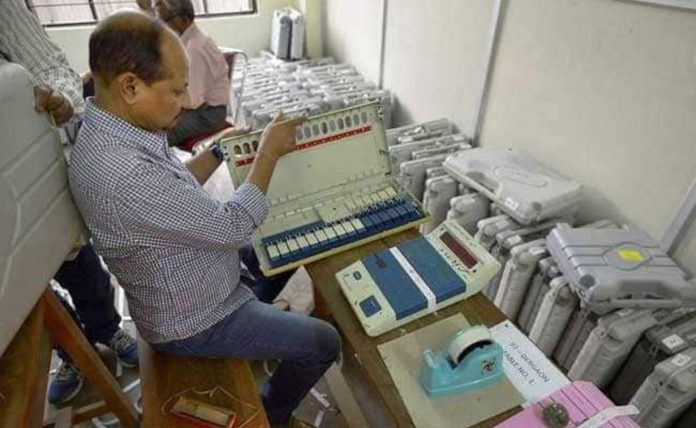Any EVM can be hacked. Why no party or candidate tries to manipulate Indian elections by hacking EVMs is the fact that they are standalone units; you need to hack every unit individually because none is connected to another. That means a massive exercise involving lakhs of machines hacked one by one! That's not feasible. If an engineer or a group of engineers tries to accomplish it, it will involve burglary on a massive scale and then the process of hacking will take a hell lot of time. Either during the robbery or before the hackers can finish their job, somebody will raise an alarm and the thieves will be caught. Remember, all contestants in an election are alert; none would sit idle on knowing there has been a grand dacoity of hundreds of EVM units and that the burglars are hacking them in some hideout.
For it is beyond manual intervention. The scale of theft has to be massive, and no case of missing or unguarded EVMs reported so far is so big that it could have altered a result. At the rate of 2,000 votes per EVM unit, you cannot alter the result of a constituency that has 17 lakh 86 thousand 372 voters on average (97 crore total voters in India as of 2019 divided by 543 Lok Sabha seats).
Random checks were done with the VVPAT machine. It was done in both 2014 and 2019 and many state elections in between. It is like food adulteration checks done by the government. A complainant or sceptic — or a bureaucrat from the ministry or department concerned — can pick any sample randomly from the factory. So far, such checks never proved any election was manipulated.
In 2014, it was not only the Congress-led UPA government at the Centre but also several anti-BJP governments in the states that also have authority over the police. Yet, the BJP won. The BJP has also lost several high-stake assembly elections since 2014: Delhi, Bihar, West Bengal, Karnataka, Madhya Pradesh, Rajasthan etc.
A few detractors, who wanted to demean Indian democracy, demonstrated how an EVM can be hacked by using American and European machines that were interconnected to make the process of counting faster. They forgot to take into account the fact that the Election Commission of India had decided right in the beginning that only the voting needed to be faster and not the process of counting as well; they never connected one EVM unit to another since the inception of EVMs in the country. This is why, despite the use of machines, it takes more than the day of the results to come out with the final score — we get to know which party won how many of the 543 seats normally in about 36 hours, with the process beginning at 8 AM one day and ending post-noon the next day. It takes so long because each unit is unsealed and its numbers counted one after the other and then the counts from all the EVMs of a given constituency are summed up to get the result for that particular seat. Thereafter, they move to another seat and repeat the process.

One or two guys demonstrated hacking an EVM in India too, but then, they had only one EVM unit each (illegally obtained) at their disposal. So, they couldn't prove that Indian elections on the whole could be manipulated.
The above is beyond the obvious logic that no government would have ever ended since the beginning of the EVM system if elections were decided by hacking. Citizens must know the process of manufacturing Indian EVMs, their custody, despatch and recollection for counting (see the attached image). The system was developed for the Election Commission of India by the state-owned Electronics Corporation of India and Bharat Electronics.
Are sceptics saying the then-Congress government induced a flaw in the system deliberately in the 1990s? Or are they saying the employees of ECI and BE are all BJP voters who wouldn't expose any alleged and assumed corrupt practice inside their office even after retirement? Do they know what “write once read many” (WORM) memory is and still think what they claim is possible? How come the Voter-Verified Paper Audit Trail in 2014 and 2019, where VVPAT samples were picked at random by all political parties for verification, could not catch any anomaly? They can't answer these questions because it would not suit the invariable propaganda by losers during all Indian elections that the winners won by manipulating the EVMs.
Surajit Dasgupta began his career as a banker with Citibank and then switched to journalism. He has worked with The Statesman, The Pioneer, Swarajya, Hindusthan Samachar, MyNation, etc and established his own media houses Sirf News and Swadharma. His professional career began in 1993. He is a mathematician by training and has acute interest in science and technology, linguistics and history. He is also a Sangeet Visharad.



